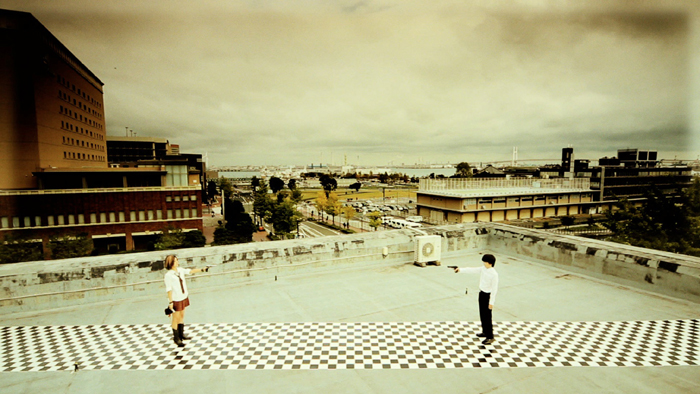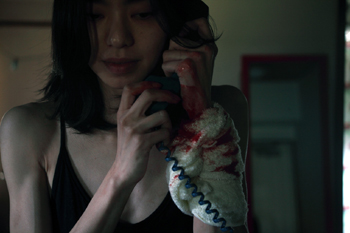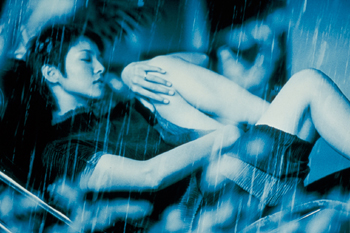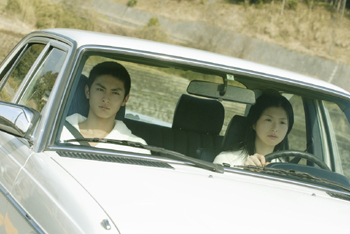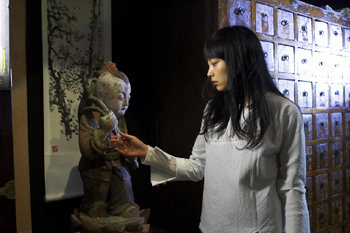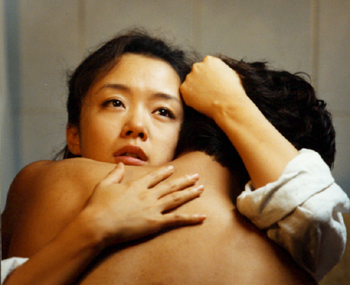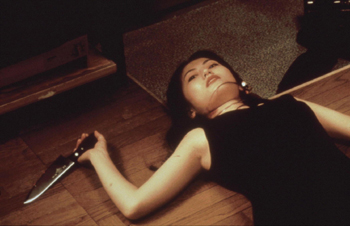Spring Fling Film Series Screens over 20 Outré Love Stories with U.S. and World Premieres Source: Japan Society Special Thanks to Shannon Jowett
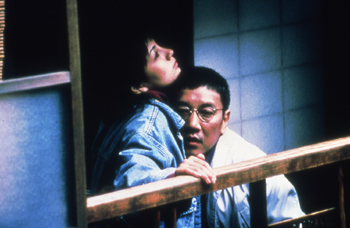 Eiji Okuda and Takami Yoshimoto in MINAZUKI. Photo courtesy of Japan Society. © 1999 Nikkatsu Corporation
Eiji Okuda and Takami Yoshimoto in MINAZUKI. Photo courtesy of Japan Society. © 1999 Nikkatsu CorporationNew York, NY - Bad romance, blind love, amour fou: this spring Japan Society screens a series of twisted, heart-blazing films from Japan and Korea. "Love Will Tear Us Apart", the sixth annual Globus Film Series, runs March 2-18 at Japan Society, and showcases select seminal stories of love gone wrong, erotic obsession and the lyrical, sometimes sadistic, and ever-elusive nature of sexual and sentimental passions. Featuring 23 films -- mostly from the past decade with a few classics from as far back as 1969 -- the "Love Will Tear Us Apart" lineup includes the U.S. premiere of Shinya Tsukamoto`s latest film, KOTOKO, and the world premiere of Koji Wakamatsu’s PETREL HOTEL BLUE, as well as Hirokazu Kore’eda’s AIR DOLL, Nagisa Oshima’s arch-classic IN THE REALM OF THE SENSES, Yukio Ninagawa’s SNAKES AND EARRINGS, Lee Sang-il’s VILLAIN, Lee Chang-dong’s OASIS, and Kim Ki-duk’s BAD GUY, among other twisted tales of star-crossed lovers on the rocks and on the run. The series kicks off March 2 with KOTOKO, hosted by actress Hyunri, whose short ROMANCE precedes the feature screening. The screening is followed by the MAKE LOVE Party. Festive attire -- from mini-gowns to hot pants -- favoring pinks or reds is recommended, and the evening concludes with a live performance by Brooklyn-based Japanese band Hard Nips. Among further special events, film scholar John Berra (Directory of World Cinema: Japan) introduces the March 3 screenings of MY DEAR ENEMY, VITAL and A SNAKE OF JUNE, and conducts a Q&A for the latter. Film historian Go Hirasawa conducts a Q&A for the March 8 screening of THE WOMAN WHO WANTED TO DIE.
 Shinya Tsukamoto`s latest film, KOTOKO, makes its US premiere. Photo courtesy of Japan Society. © 2011 Kaijyu Theater/ Makotoya
Shinya Tsukamoto`s latest film, KOTOKO, makes its US premiere. Photo courtesy of Japan Society. © 2011 Kaijyu Theater/ MakotoyaAside from its thematic thrust, "Love Will Tear Us Apart" celebrates two major East Asian film industries concomitantly, covering what could be described as a transnational “cinema of transgression” that goes beyond borders. “Beyond the obvious geographic pairing, the complex relationship between Korea and Japan provides a fascinating and inextricably entwined coupling of national cinematic identities, which are at once complementary and conflicting,” says Samuel Jamier, chief film programmer at Japan Society, who curated the series. He continues: “Although both Japanese and Korean films and filmmakers demonstrate unique preoccupations, narrative traditions, structures and cultural sensibilities, a considerable amount of shared ground is shown, leading directly to unique avenues of artistic collaboration (Korean actress Bae Doo-Na and director Hirokazu Kore’eda, Kim Ki-duk and Joe Odagiri), and ultimately revealing a similar visual grammar and inclination towards the emotional violence that flows beneath the quiet surface of societal restraints.” Another layer of the series is the focus it brings onto the works of film directors Shinya Tsukamoto (3 films, including the U.S. premiere of his critically acclaimed KOTOKO), Koji Wakamatsu (3 films, including a world premiere), and the enfant terrible of Korean cinema, Kim Ki-duk (3 films). The Korean selection aims to capture a “best of” contemporary Korean cinema, with offerings from the most prominent filmmakers from the peninsula: Lee Chang-dong, Hong Sang-soo, and Lee Yoon-ki, in addition to Kim Ki-duk. Japan Society is located at 333 East 47th Street between First and Second avenues (accessible by the 4/5/6 and 7 subway at Grand Central or the E and V subway at Lexington Avenue). Tickets are $12 / $9 Japan Society members, except for the March 2 opening night screening of KOTOKO, $20/$15 Japan Society members, including MAKING LOVE after party. Purchases of more than 5 tickets for at least 5 different films receive $2 off each ticket. Tickets can be purchased in person at Japan Society, by calling the box office at 212-715-1258, or by visiting japansociety.org. For more information, call 212-832-1155 or visit the website. LOVE WILL TEAR US APART SCREENING SCHEDULE
KOTOKO Friday, March 2, 7:30 pm **Hosted by Actress Hyunri 2011. 91 min. HD Cam SR, color, in Japanese with English subtitles. Directed by Shinya Tsukamoto. With Cocco, Shinya Tsukamoto. KOTOKO © 2011 Kaijyu Theater / Makotoya With his latest film, a visceral piece of undiluted artistic ferocity, Japanese genre master Shinya Tsukamoto (TETSUO, TOKYO FIST, NIGHTMARE DETECTIVE) delves into the dark recesses of a young mother’s mind: Kotoko (Cocco), holds a fragile grip on reality, psychotically protecting her son from what she imagines are constant predatory threats. As confounding, dark fantasies plague and eventually overwhelm her, things tumble out of control and her baby is taken away after she is suspected of being a child abuser. Soon, she becomes intimate with a novelist who is enchanted by her singing. From here Kotoko`s increasingly fractured perception comes to personify the unsettling contradictions of the grotesque: at once repellent and fantastic, a shock and a wonder, translating “the fortissimo eloquence of inner lives magnificently tortured”, to borrow poet Ted Hughes’ words. “Well before the end of the film it feels classic. It can only really be compared with truly classic films. Films such as Polanski’s REPULSION or REALM OF THE SENSES by Oshima.” – Gertjan Zuilhof, 2012 International Film Festival Rotterdam. Awards: Venice Film Festival, 2011, Venice Horizons Award (Shinya Tsukamoto). Preceded by the short, ROMANCE, directed by Toshiro Sonoda (Japan, 2010 3:14 min., HD Cam, color, with Hyunri.) A nerdy high-school boy comes face to face with the class "bad girl", and believes his frustration can be resolved by eliminating her. It turns out that she shares his idea, initiating a deadly duel. Lead actress, Hyunri, co-hosts the opening.
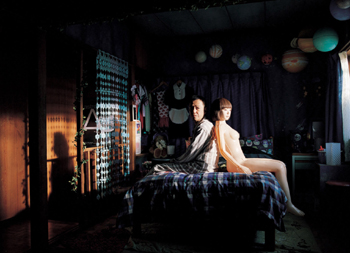 Itsuji Itao and Bae Doona in AIR DOLL. Photo courtesy of Japan Society. © 2009 Gouda Yoshiie/ Shogakukan/
Itsuji Itao and Bae Doona in AIR DOLL. Photo courtesy of Japan Society. © 2009 Gouda Yoshiie/ Shogakukan/ AIR DOLL (????, Kuki ningyo) Saturday, March 3, 2:00 pm 2009. 125 min., 35 mm, color, in Japanese with English subtitles. Directed by Hirokazu Kore-eda. With Bae Doo-na, Arata, Itsuji Itao, Joe Odagiri, Masaya Takahashi. Air Doll © 2009 Gouda Yoshiie / Shogakukan / "Air Doll" Production Committee. Internationally acclaimed director Hirokazu Kore-eda`s most surprising work to date is an anti-fairytale about a blowup doll that comes to life in modern, lonesome Tokyo. Korean actress Bae Doo-na, whose roles in such films as LINDA LINDA LINDA and THE HOST have made her a cult icon, stars as the titular doll, bought by a quiet loner for companionship. Emerging into life, she escapes his hermit`s apartment and seeks out the modern world. What she discovers is a city of isolation, where both men and women have retreated into their own fantasies. Kore-eda deftly turns the material into a melancholy, philosophical exploration of the complexities of love and loss, joy and pain, fantasy and reality. Taiwanese cinematographer Mark Lee Ping-bing (IN THE MOOD FOR LOVE; FLOWERS OF SHANGHAI) gives the pop-gloss of 21st century life a particularly ethereal, floating-world allure, adding further power to this bittersweet romantic fantasy. “The urban fairytale about an inflatable sex doll come to life gradually unfurls as an achingly beautiful meditation on loneliness and longing in the city.” – Maggie Lee, Hollywood Reporter.
 Jeon Do-yeon and Ha Jeong-woo in MY DEAR ENEMY. Photo courtesy of Japan Society. © 2008 Sponge/ KTB Capital/ Lotte Entertainment/ CJ Venture Investment/ SBS Contents Hub/ KTH Paran/ B.O.M. Film Productions Co./ FineCut
Jeon Do-yeon and Ha Jeong-woo in MY DEAR ENEMY. Photo courtesy of Japan Society. © 2008 Sponge/ KTB Capital/ Lotte Entertainment/ CJ Venture Investment/ SBS Contents Hub/ KTH Paran/ B.O.M. Film Productions Co./ FineCutMY DEAR ENEMY (?? ??, Meotjin haru) Saturday, March 3, 4:30 pm **Introduction by John Berra 2008. 123 min., 35 mm, color, in Korean with English subtitles. Directed by Lee Yoon-ki. With Jeon Do-yeon and Ha Jeong-woo. My Dear Enemy © 2008 Sponge / KTB Capital / Lotte Entertainment / CJ Venture Investment / SBS Contents Hub (as SBSi) / KTH Paran / B.O.M. Film Productions Co. /FineCut. A woman (Jeon Do-yeon winner of the Best Actress award at the 2007 Cannes Film Festival -- the first Korean ever to receive an acting award there) shows up unexpectedly at her ex-boyfriend`s favorite betting haunt and demands that he repay a $2,600 debt. In a seductive but stumbling waltz of minor-league emotions, Lee`s beautifully crafted sentimental journey subtly interrogates the two troubled spirits of the ex-lovers as they embark on an uneasy road trip to gather the money, drifting between disparate melancholy directions and small jolts of desire. Based on the short novel by Azuko Taira. “It`s an artful, slightly absurdist romance, reminiscent of the gender-war comedies of Hong Sang-soo (Woman on the Beach) but more straightforward, with its meanings, and its feelings, much closer to the surface.” –Manohla Dargis, The New York Times. "Lee Yoon-ki (THIS CHARMING GIRL) the guru of transient modern love and master raconteur has directed his best film yet. Eloquently scripted, with finely tuned dialogue, immaculate characterization and emotions that are brewed like coffee until the aroma comes out..." –Maggie Lee, The Hollywood Reporter.
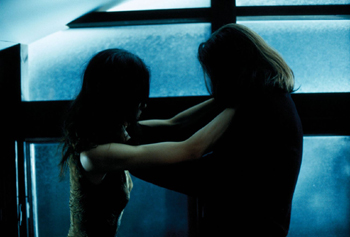 Nami Tsukamoto and Tadanobu Asano in VITAL. Photo courtesy of Japan Society. © 2004 Shinya Tsukamoto/ Kaijyu Theater
Nami Tsukamoto and Tadanobu Asano in VITAL. Photo courtesy of Japan Society. © 2004 Shinya Tsukamoto/ Kaijyu TheaterVITAL (?????, Vitaru) Saturday, March 3, 7:00 pm **Introduction by John Berra 2004. 86 min. 35 mm, in Japanese with English subtitles. Directed by Shinya Tsukamoto. With Tadanobu Asano, Nami Tsukamoto and Kiki. Vital © 2004 Shinya Tsukamoto / Kaijyu Theater. Hiroshi Takagi (played by Tadanobu Asano -- ZATOICHI, ICHI THE KILLER), a young man in his 20s, awakens in a hospital bed to find an auto accident has completely wiped out his memory. Back home with his parents and attempting to rebuild his life, he comes across a medical textbook full of detailed drawings of dissections. Utterly fascinated by the subject, Hiroshi is drawn to the medical school to which he was once accepted but refused to attend. There, he catches the eye of Ikumi Yoshimoto (Kiki), a brilliant, taunting fellow student who desires his affections. But it`s the dead woman on the cadaver table (Nami Tsukamoto) who becomes his obsession. Could she be the key to unlocking his forgotten past? “Macabre yet oddly poignant, graphically physical but also metaphysical, clinical yet unexpectedly soulful.” – David Rooney, Variety. Awards: Mar del Plata Film Festival, 2005, Best Film (Shinya Tsukamoto); Sitges – Catalonian International Film Festival, 2004, New Visions Award (Shinya Tsukamoto).
A SNAKE OF JUNE (????, Rokugatsu no hebi) Saturday, March 3, 9:00 pm **Introduction and Q&A with John Berra 2003. 77 min., 35 mm, color, in Japanese with English subtitles. Directed by Shinya Tsukamoto. With Asuka Kurosawa, Yuji Kohtari, Shinya Tsukamoto, Masato Tsujioka, Susumu Terajima, Tomorowo Taguchi. A Snake of June © Shinya Tsukamoto / Kaijyu Theater. In an anonymous Japanese metropolis, a dark erotic force infiltrates the lives of a reserved career woman in her 30s and her obsessively clean workaholic husband. Invading the most private aspects of the couple?s lives, a mysterious stranger sends an envelope bearing the inscription "Your Husband?s Secrets." A surreal, deliriously perverse tale of buried sexual desires, A SNAKE OF JUNE goes to the razored edge of obsession and back.
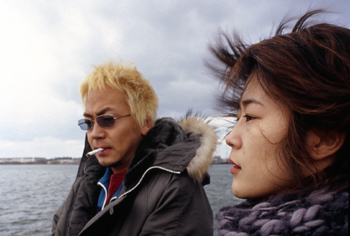 Nao Omori and Shinobu Terajima in VIBRATOR. Photo courtesy of Japan Society. © 2003 Studio Three, CIA, Happinet Pictures, Nippan, CINE QUA NON, Eisei Gekijo
Nao Omori and Shinobu Terajima in VIBRATOR. Photo courtesy of Japan Society. © 2003 Studio Three, CIA, Happinet Pictures, Nippan, CINE QUA NON, Eisei GekijoVIBRATOR (???????) Sunday, March 4, 5:30 pm 2003. 95 min., 35 mm, color, in Japanese with English subtitles. Directed by Hiroki Ryuichi. With Shinobu Terajima, Nao Omori, Riho Makise, Jun Murakami, Eugene Nomura, Miki Sakajou, Tomorowo Taguchi. Vibrator © Studio Three, CIA, Happinet Pictures, Nippan, CINE QUA NON, Eisei Gekijo. Named Best Japanese Film of 2003 by The Japan Times and noted Japanese film authority Donald Richie, VIBRATOR is a remarkably affecting road movie brimming with cathartic intensity and bold eroticism. Directed by international rising star Ryuichi Hiroki (I AM AN S&M WRITER, TOKYO TRASH BABY, IT`S ONLY TALK) and based on the novel by Mari Akasaka, VIBRATOR follows Rei (Shinobu Terashima), a 30-something freelance writer wrestling with psychological instability and a penchant for booze. One night while shopping for beer at an urban mini-mart, Rei runs into Okabe (Nao Omori, of Takashi Miike`s ICHI THE KILLER), a handsome young trucker. Impulsive and captivated, she climbs into his rig for an impromptu road trip of sexual and emotional self-discovery. Psychologically raw and surprisingly uplifting, VIBRATOR, with its frank approach to sexuality, relationships and personal liberation, represents a creative milestone for director Hiroki. "A standout! Ryuichi Hiroki`s VIBRATOR is a miniaturist, serenely bittersweet take on the intimate strangers genre recently fetishized in Lost in Translation." --Dennis Lim, The Village Voice. Awards: Blue Ribbon Awards, 2004, Best Actress (Shinobu Terajima); Cinemanila International Film Festival, 2004, Lino Brocka Award (Ryuichi Hiroki); Hochi Film Awards, 2003, Best Actress (Shinobu Terajima); Kinema Junpo Awards, 2004, Best Actress (Shinobu Terajima), Best New Actress (Shinobu Terajima), Best Screenplay (Haruhiko Arai), Best Supporting Actor (Nao Ohmori).
M Sunday, March 4, 7:30 pm 2006. 110 min., 35 mm, color, in Japanese with English subtitles. Directed by Hiroki Ryuichi. With Miwon, Kengo Kora, Tomorowo Taguchi, Nao Omori, Jiro Tawaro. M © 2006 “M” Film Partners. With M, director Hiroki Ryuichi has made a BELL DE JOUR for the post-postmodern age. A bored housewife, Satoko (Miwon), lives comfortably with her husband Hideyuki and her son Masato. One day she receives an email from a dating site and begins a double life as a prostitute. She soon attracts the attention of a young man named Minoru (Kengo Kora), who works as a paperboy. When Minoru`s friend shows him erotic pictures of non-professional women, he recognizes Satoko and sees in her eyes the same terrified look his mother had when his father beat her. He subsequently takes to trailing Satoko, and when he discovers she is being threatened by a yakuza (Tomorowo Taguchi), he is unable to hold back from stepping in to intervene. A psychotic drama with erotic overtones adapted from a novel by Seishu Hase, M covers Hiroki Ryuichi`s familiar obsession with people who follow their fantasies to the outer limits.
PETREL HOTEL BLUE (?????????, Umi tsubame hoteru ? buru) Wednesday, March 7, 7:00 pm **World Premiere 2012. 85 min. Format TBD, color, in Japanese with English subtitles. Directed by Koji Wakamatsu. With Arata, Ryushi Mizukami and Kiyohiko Shibukawa. Petrel Hotel Blue © 2012 Wakamatsu Production. In this revenge drama that marks Koji Wakamatsu’s return to the screen, an ex-con’s plans for bloody retribution are complicated after he meets a young woman. With a score by American musician (and ex-Sonic Youth member) Jim O’Rourke. The film is scheduled for theatrical release in Japan on March 24, 2012.
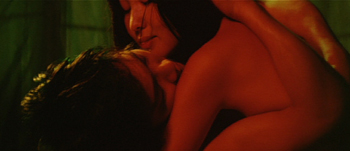 Ken Yoshizawa and Yoko Muto in RUNNING IN MADNESS, DYING IN LOVE. Photo courtesy of Japan Society. © 1969 Wakamatsu Production
Ken Yoshizawa and Yoko Muto in RUNNING IN MADNESS, DYING IN LOVE. Photo courtesy of Japan Society. © 1969 Wakamatsu ProductionRUNNING IN MADNESS, DYING IN LOVE (?????, Kyoso joshi-ko) Wednesday, March 7, 9:00 pm 1969. 72 min. 35 mm, color, in Japanese with live English subtitles. Directed by Koji Wakamatsu. With Ken Yoshizawa, Yoko Muto, Rokko Toura. Running in Madness, Dying in Love © 1969 Wakamatsu Production. While clashes between demonstrators and police are raging in the streets of Tokyo, a young man takes refuge at his policeman brother`s house. The two brothers soon come to blows, but the intervention of the policeman`s wife leads to the death of her husband by his own gun. The young man and the wife cover up the murder by making it look like a suicide. They become lovers and flee north into the Tohoku area, as if they were being pursued by the ghost of the murdered husband, their sexual passion and the pulse of the changing times.
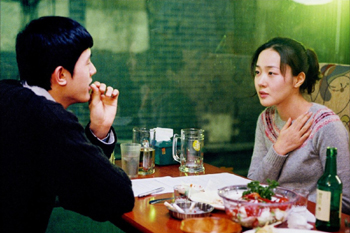 Kim Sang-kyung and Uhm Ji-won in TALE OF CINEMA. Photo courtesy of Japan Society. © 2005 Jeonwonsa Film/ MK2/ arte France Cinéma/ MVP Happinet
Kim Sang-kyung and Uhm Ji-won in TALE OF CINEMA. Photo courtesy of Japan Society. © 2005 Jeonwonsa Film/ MK2/ arte France Cinéma/ MVP HappinetTALE OF CINEMA (???, Geuk jang jeon) Thursday, March 8, 2012, 7:00 pm 2005. 82 min., 35 mm, color, in Korean with English subtitles. Directed by Hong Sang-Soo. With Kim Sang-kyung, Lee Ki-woo, Uhm Ji-won. Tale of Cinema © 2005 Jeonwonsa Film / MK2 / arte France Cinéma / MVP Happinet. TALE OF CINEMA is a turning point in director Hong Sang-Soo’s oeuvre, marking the debut of many elements now recognized as signatures of his distinct style: the active zoom shot, the setting in the world of filmmaking, and the theme of the anxiety of influence, an important elaboration of Hong`s overarching comedy of failure. In Seoul, the paths of two men and one woman intersect and move apart from one another, centering around their love for cinema. A suicidal student meets a young woman who decides to follow him in his fatal gesture. Coming out of a cinema, Tongsu, an unsuccessful filmmaker, spots a beautiful young woman and recognizes her: she is the main actress in the film he has just seen. The life of this wavering and distressed man strangely echoes the one of the young man from the beginning. “This one has a sheer simplicity and clarity.” – Derek Elley, Variety. Nomination: Cannes Film Festival, 2005, Palme d’Or (Hong Sang-soo).
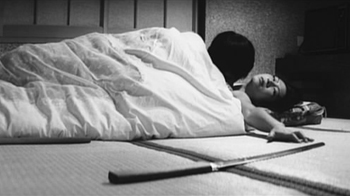 Eriko Shima and Hiroshi Yajima in THE WOMAN WHO WANTED TO DIE. Photo courtesy of Japan Society. © 1970 Wakamatsu Production
Eriko Shima and Hiroshi Yajima in THE WOMAN WHO WANTED TO DIE. Photo courtesy of Japan Society. © 1970 Wakamatsu ProductionTHE WOMAN WHO WANTED TO DIE (??? ?????, Segura magura: shinitai onna) Thursday, March 8, 9:00 pm **Intro and Q&A with Go Hirasawa 1970. 71 min., 35 mm, b&w, in Japanese with live English subtitles. Directed by Koji Wakamatsu. With Eriko Shima and Hiroshi Yajima. The Woman Who Wanted to Die © 1970 Wakamatsu Production. Still unreleased in Japan, the film is the epitome of Japanese experimental cinema, in the same lineage as Kiju Yoshida’s EROS+MASSACRE. At the same time as author and radical historical figure Yukio Mishima committed suicide in public, two couples accidentally meet at an inn in the countryside. The man and the woman, now with different companions, know each other from years ago.
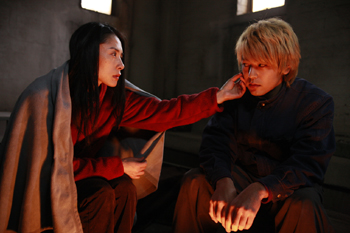 Eri Fukatsu and Satoshi Tsumabuki in VILLAIN. Photo courtesy of Japan Society. © 2010 Toho Co., Ltd./ Dentsu Inc./ The Asahi Shimbun Company/ Sony Music Ent. (Japan) Inc./ Nippon Shuppan Hanbai Inc./ Horipro Inc./ Amuse Inc./ KDDI/ Yahoo Japan Corporation/ Tsutaya Group/ Asahi Shimbun Publications Inc.
Eri Fukatsu and Satoshi Tsumabuki in VILLAIN. Photo courtesy of Japan Society. © 2010 Toho Co., Ltd./ Dentsu Inc./ The Asahi Shimbun Company/ Sony Music Ent. (Japan) Inc./ Nippon Shuppan Hanbai Inc./ Horipro Inc./ Amuse Inc./ KDDI/ Yahoo Japan Corporation/ Tsutaya Group/ Asahi Shimbun Publications Inc.VILLAIN (??, Akunin) Friday, March 9, 7:30 pm 2010. 139 min., 35 mm, color, in Japanese with English subtitles. Directed by Lee Sang-il. With Satoshi Tsumabuki, Eri Fukatsu, Akira Emoto, Masaki Okada, Kirin Kiki, Hikari Mitsushima. Villain © 2010 TOHO CO., LTD. / DENTSU INC. / The Asahi Shimbun Company / Sony Music Entertainment (Japan) Inc. / NIPPON SHUPPAN HANBAI INC. / HORIPRO INC. / AMUSE INC. / KDDI / Yahoo Japan Corporation / TSUTAYA Group / Asahi Shimbun Publications Inc. All Rights Reserved. When two lonely souls meet on an online dating site, they instantly fall in love. But the man has a secret -- he is the one who killed a woman whose murder has been in the news for days. When he tries to turn himself in, she stops him and the desperate lovers go on the run, only to intertwine with the lives of the killer’s and victim’s families. Based on Shuichi Yoshida`s bestselling crime noir novel, VILLAIN was nominated for numerous awards at the 2011 Japan Academy Prize, including Best Film and Best Director (which was director Lee`s second nomination, after his 2006 win for HULA GIRLS), and won five, which included all four acting awards and for the score by Joe Hisaishi. “Lee has crafted a sparse, elegant portrait of loneliness, grief and desperation, with some brilliantly convincing performances adding to the film`s appeal.” – Sarah Cronin, Electric Sheep. Awards: Awards of the Japanese Academy, 2011, Best Actor (Satoshi Tsumabuki), Best Actress (Eri Fukatsu), Best Music Score (Joe Hisaishi), Best Supporting Actor (Akira Emoto), Best Supporting Actress (Kirin Kiki); Kinema Junpo Awards, 2011, Best Director (Lee Sang-il), Best Film (Lee Sang-il).
TIME (??, Sigan) Saturday, March 10, 3 pm 2006. 97 min., 35 mm, in Korean with English subtitles. Directed by Kim Ki-duk. With Ha Jung-woo and Seong Hyeon-ah. Time © Kim Ki-Duk Film / Happinet Pictures. Director Kim Ki-duk`s 13th feature questions the most basic foundation of love and human nature. It deals with a woman in doubtful agony over her lover -- can they love each other forever? Won`t he tire of her as time goes by? The movie delicately describes the correlation between time and human relations, and the changes in the relationship itself, but things go extreme as the female character changes her look and her body through plastic surgery to always be loved by the man she adores. “I can`t see how anybody, no matter how keen to preserve a positive self-image, could fail to identify with TIME, [director] Kim`s cheerfully lunatic allegory about two young lovers.” – Mike D’Angelo, Village Voice. Awards: Chicago International Film Festival, 2006, Plaque (Kim Ki-duk); Fantasporto, 2007, Best Actor (Ha Jung-woo); Sitges – Catalonian International Film Festival, 2006, Best Make-up (Jang Jin).
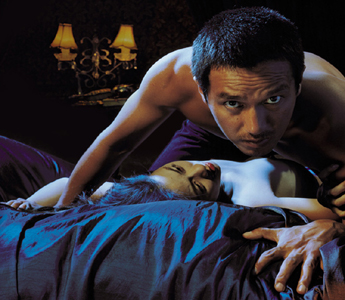 Cho Jae-hyun and Seo Won in BAD GUY. Photo courtesy of Japan Society. © 2002 LJ Film/ Prime Entertainment
Cho Jae-hyun and Seo Won in BAD GUY. Photo courtesy of Japan Society. © 2002 LJ Film/ Prime EntertainmentBAD GUY (?? ??, Nabbeun namja) Saturday, March 10, 2012, 5:15 pm 2002. 100 min., 35 mm, in Korean with English subtitles. Directed by Kim Ki-duk. With Cho Jae-hyun and Seo Won. Bad Guy © LJ Film / Prime Entertainment. When a local pimp is publicly humiliated by a snobbish college girl, he manipulates her into a life of sexual slavery at his brothel. As he watches her nightly humiliation from behind a two-way mirror, his obsessive desire consumes him while she learns there is no love more complete than her captor`s. “BAD GUY, one of the seven films in Kim`s fascinating back catalog, is another kind of cocktail -- simple, bitter, served straight and in an unwashed glass.” – Michael Atkinson, The Village Voice. Awards: Fukuoka Asian Film Festival, 2002, Grand Prix (Kim Ki-duk); Grand Bell Awards, 2002, Best New Actress (Seo Won); Sitges – Catalonian International Film Festival, 2002, Orient Express Award (Kim Ki-duk).
DREAM (??, Bimong) Saturday, March 10, 7:30 pm 2008. 95 min., 35 mm, in Korean and Japanese with English subtitles. Directed by Kim Ki-duk. With Joe Odagiri, Lee Na-young, Park Ji-ah. Dream © 2008 Kim Ki-Duk Film / Sponge / Style Jam. From Korea`s number one cinematic transgressor comes this surreal, dark fantasy about two people who find that their dreams are connected. Wrought with director Kim Ki-Duk’s typical emotional outrageousness, the film’s full on physicality and over-the-top trajectory chase a bigger philosophical fish: are dreams the product of reality or is reality is a product of our dreams. Starring Japan`s Joe Odagiri and Korea`s Lee Na-Young.
HAPPY END (?? ??, Haepi endue) Saturday, March 10, 9:30 pm 1999. 99 min., 35 mm, in Korean with English subtitles. Directed by Jung Ji-woo. With Choi Min-sik, Jeon Do-yeon, Ju Jin-mo, Hwang Mi-seon. Happy End © 1999 MK Pictures. A provocative drama that caused a storm of controversy in its native Korea. A recently laid-off man has trouble dealing with being unemployed. Depressed and unable to find another job, he discovers his career-oriented wife has lost interest in him. Soon he finds that she has rekindled her relationship with a former lover, leading to revelations that are destined to change their lives forever. Jeon Do-yeon, who plays the role of the unfaithful wife sizzles as usual. This was one of her earlier roles before she received the Best Actress Award at the 2007 Cannes Film Festival. Awards: Asia-Pacific Film Festival, 2000, Best Actor (Choi Min-sik). Preceded by the short, HAIR, directed by Jang Joon-hwan (SAVE THE GREEN PLANET). With Shin Ha-Kyun (SAVE THE GREEN PLANET). A short created for the Next Search Film Festival, HAIR is a fantasy drama in which chest hair truly tears lovers apart.
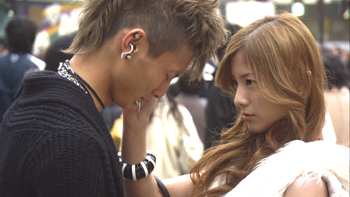 Kengo Kora and Yuriko Yoshitaka in SNAKES AND EARRINGS. Photo courtesy of Japan Society. © 2008 “Snake and Earrings” Film Partners
Kengo Kora and Yuriko Yoshitaka in SNAKES AND EARRINGS. Photo courtesy of Japan Society. © 2008 “Snake and Earrings” Film PartnersSNAKES AND EARRINGS (?????, Hebi ni piasu) Friday, March 16, 7:30 pm 2008. 123 min., 35 mm, color, in Japanese with English subtitles. Directed by Yukio Ninagawa. With Yuriko Yoshitaka, Kengo Kora, Arata, Tatsuya Fujiwara, Toshiaki Karasawa. Snakes and Earrings © 2008 “Snake and Earrings” Film Partners. Based on the best-selling novel about a woman who decides that her one goal in life is to have her tongue split. Yuriko Yoshitaka gives an incredibly raw, totally exposed, award-winning performance the anchor for this emotional, erotic, disturbing and seductive movie. Awards: Blue Ribbon Awards, 2009, Best New Talent (Yuriko Yoshitaka). Preceded by the short, HAIR (description above).
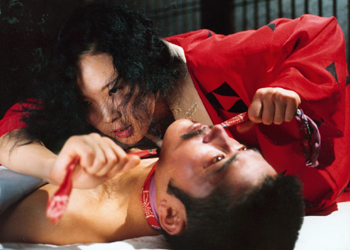 Eiko Matsuda and Tatsuya Fuji in IN THE REALM OF THE SENSES. Photo courtesy of Japan Society. © 1976 Argos Films/ Oshima Productions/ Shibata Organization
Eiko Matsuda and Tatsuya Fuji in IN THE REALM OF THE SENSES. Photo courtesy of Japan Society. © 1976 Argos Films/ Oshima Productions/ Shibata OrganizationIN THE REALM OF THE SENSES (??????, Ai no korida) Friday, March 16, 10:00 pm 1976, 102 min., 35 mm, color, in Japanese with English subtitles. Directed by Nagisa Oshima. With Tatsuya Fuji, Eiko Matsuda, Aoi Nakajima. In the Realm of the Senses © 1976 Argos Films / Oshima Productions / Shibata Organisation. One of the most controversial films of all time. A graphic portrayal of insatiable sexual desire, Nagisa Oshima`s film, set in 1936 and based on a true incident, depicts a man and a woman (Tatsuya Fuji and Eiko Matsuda) consumed by a transcendent, destructive love while living in an era of ever escalating imperialism and governmental control. Less a work of pornography than of politics, IN THE REALM OF THE SENSES is a bold, taboo-breaking milestone. “One of the most extraordinary moments in screen history. Oshima`s film widens and deepens the sensual realm.” – Peter Bradshaw, Guardian [UK]. Awards: British Film Institute Awards, 1976, Sutherland Trophy (Nagisa Oshima); Hochi Film Awards, 1976, Best Actor (Tatsuya Fuji).
CHAOS (???, Kaosu) Saturday, March 17, 3:00 pm 2000. 107 min., DigiBeta, color, in Japanese with English subtitles. Directed by Hideo Nakata. With Miki Nakatani, Masato Hagiwara, Ken Mitsuishi, Jun Kunimura. Chaos © 1999 WOWOW. From director Hideo Nakata (THE RONG, THE RING 2), Japan`s modern sensei of suspense, comes an ingenious and hypnotic thriller of unrelenting intensity. After a successful Japanese businessman`s ravishing trophy wife (Miki Nakatani) vanishes, sadistic and taunting ransom demands arrive and the police are summoned. As the true nature of the stakes for the captor (Masato Hagiwara) and his captive unfolds, CHAOS fluidly transforms from a precision neo-noir into a macabre and shocking thriller and ultimately into a lurid, intoxicating sexual gothic. In CHAOS, Nakata effortlessly and legitimately invokes genre classics like LES DIABOLIQUES and VERTIGO while crafting a sleekly diabolical puzzle as audaciously constructed and narratively extravagant as MEMENTO or RUN LOLA RUN. Unsettling, riveting, hallucinatory, suspenseful, and erotic, CHAOS is masterful contemporary entertainment. "Devotees of corpse-swapping betrayal orgies will find expert filmmaking awake to the realities of apprehension and unease." – Michael Atkinson, The Village Voice
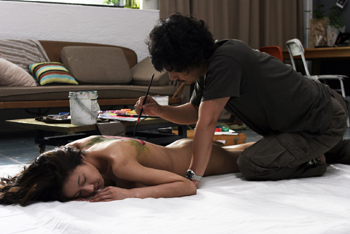 Chae Min-seo and Park Sang-yeon in VEGETARIAN. Photo courtesy of Japan Society. © 2009 Sponge/ Blue Tree Pictures/ Rudolf Film/ Mirrovision
Chae Min-seo and Park Sang-yeon in VEGETARIAN. Photo courtesy of Japan Society. © 2009 Sponge/ Blue Tree Pictures/ Rudolf Film/ MirrovisionVEGETARIAN (?????, Chaesikjuuija) Saturday, March 17, 5:30 pm South Korea. 2009. 111 min., 35 mm, color, in Korean with English subtitles. Directed by Lim Woo-seong. With Chea Min-Seo, Kim Hyun-Sung, Kim Yeo-Jin, Kim Young-Jae. Vegetarian © 2009 Sponge / Blue Tree Pictures / Rudolf Film / Mirrovision. Ominous dreams haunt and drive a young woman to abolish meat from her diet and her household, and even reject her husband, who smells of meat. Her family mistakes her sudden fixation for insolence, and she soon grows despondent, alienating herself from everyone. Her sister tries to reach her, but only her brother-in-law, an artist, manages to penetrate her withdrawn state. Her mysterious trauma ignites creativity and desire in him, and they collaborate passionately on beautiful body-painting art -- drawing on her psychological pain but also providing the catalyst for a mystical sexual transformation. Nomination: Sundance Film Festival, 2010, Grand Jury Prize.
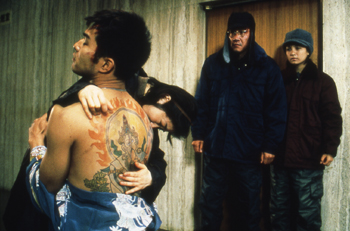 Eiji Okuda and Takami Yoshimoto in MINAZUKI. Photo courtesy of Japan Society. © 1999 Nikkatsu Corporation
Eiji Okuda and Takami Yoshimoto in MINAZUKI. Photo courtesy of Japan Society. © 1999 Nikkatsu CorporationMINAZUKI (??, Minazuki) Sunday, March 18, 4:30 pm 1999. 114 min., 35 mm, color, in Japanese with English subtitles. Directed by Mochizuki Rokuro. With Eiji Okuda, Kazuki Kitamura, Takami Yoshimoto, Keiko Oginome, Takashi Saito. Minazuki © 1999 Nikkatsu Corporation. Akira`s wife walks out on him, leaving him to confide in his gangster brother-in-law. Using only a cryptic note as a clue, the two brothers go on a road trip to find his wife. After a series of violent encounters with strangers, Akira meets a prostitute. The pair starts a relationship. Awards: Japanese Professional Movie Awards, 2000, Best Actress (Takami Yoshimoto); Kinema Junpo Awards, 2000, Best New Actor (Kazuki Kitamura); Yokohama Film Festival, 2000, Best New Talent (Takami Yoshimoto), Best Supporting Actor (Kazuki Kitamura).
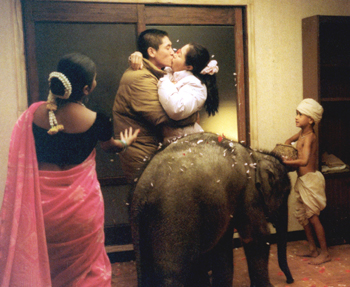 Sol Kyung-gu and Moon So-ri in OASIS. Photo courtesy of Japan Society. © 2002 Dream Venture Capital/ East Film Company/ UniKorea Pictures/ Cineclick Asia
Sol Kyung-gu and Moon So-ri in OASIS. Photo courtesy of Japan Society. © 2002 Dream Venture Capital/ East Film Company/ UniKorea Pictures/ Cineclick AsiaOASIS (????) Sunday, March 18, 7:00 pm 2002. 132 min., 35 mm, color, in Japanese with English subtitles. Directed by Lee Chang-Dong. With Sol Kyung-gu and Moon So-ri. Oasis © 2002 Dream Venture Capital / East Film Company / UniKorea Pictures / Cineclick Asia. Jong-Du (Sol Kyung-gu) is back on the streets after serving a brief prison term. In an awkward attempt at reconciliation, Jong-Du seeks out the family of the man he killed in a hit-and-run accident. Even though he is shunned by the victim`s family, he becomes intrigued by the man`s daughter, a young woman (Moon So-ri) with cerebral palsy. After a number of secret encounters and outings, the handicapped young woman and the reckless young man fall in love. The couple is confronted by the harsh reality of a discriminating society. Matters are made worse by the opposition of both families to their relationship. Still their love continues to grow, almost oblivious to the forces trying to tear them apart. “Take my word for it: OASIS is one of the most deeply felt love stories of the screen in ways that you must endure a little suffering of your own to appreciate.” – Andrew Sarris, The New York Observer. Awards: 59th Venice International Film Festival, 2002, Best Director (Lee Chang-Dong); Marcello Mastroianni Award for Best Young Actor/Actress (Moon So-ri); FIPRESCI Award (International Critics` Prize); 19th Seattle International Film Festival, 2003 Best Actor (Sol Kyung-Goo); Best Actress (Moon So-ri), 21st Vancouver International Film Festival, 2002; Chief Dan George Humanitarian Award. LOVE WILL TEAR US APART SCHEDULE AT A GLANCE Friday, March 2 7:30 - KOTOKO Saturday, March 3 2:00 - AIR DOLL 4:30 - MY DEAR ENEMY 7:00 - VITAL 9:00 - A SNAKE OF JUNE Sunday, March 4 5:30 - VIBRATOR 7:30 - M Wednesday, March 7 7:00 - PETREL HOTEL BLUE 9:00 - RUNNING IN MADNESS, DYING IN LOVE Thursday, March 8 7:00 - TALE OF CINEMA 9:00 - THE WOMAN WHO WANTED TO DIE Friday, March 9 7:30 - VILLAIN Saturday, March 10 3:00 - TIME 5:15 - BAD GUY 7:30 - DREAM 9:30 - HAPPY END Friday, March 16 7:30 - SNAKES AND EARRINGS 10:00 - IN THE REALM OF THE SENSES Saturday, March 17 3:00 - CHAOS Sunday, March 18 4:30 - MINAZUKI 7:00 - OOASIS GUESTS Hyunri is a Tokyo-based actress and model of Korean descent. She is the host of the popular TBS show THE KING`S BRUNCH. She has appeared in numerous Korean and Japanese music videos (Maiko Nakamura, CHEMISTRY, Lee Jung, MihiMaru), short films (ROMANCE, directed by Toshiro Sonoda), Korean and Japanese feature films (FATE), TV dramas (most notably the Fuji-TV drama FREETERS), and on the stage. Go Hirasawa is a Film Historian and Lecturer at Meiji Gakuin University, Tokyo, and the editor of Underground Film Archives and various texts on Koji Wakamatsu and the Art Theatre Guild. He curated the 2009 Globus Film Series: Shinjuku Ecstacy at Japan Society with Vienna-based scholar Roland Domenig. John Berra is a Lecturer in Film Studies at Nanjing University, where he teaches courses on American Independent Cinema, Japanese Cinema and the Cinematic City while researching independent feature film production in China. He is the author of Declarations of Independence: American Cinema and the Partiality of Independent Production (Intellect, 2010) and the editor of the Directory of World Cinema: Japan (Intellect, 2010/2012). John has also contributed liner notes to the Madman Entertainment releases of AN ACTOR’S REVENGE and 7 Films by Ozu Yasujiro.
About Japan Society
Founded in 1907, Japan Society is a world-class, multidisciplinary hub for global leaders, artists, scholars, educators, and English and Japanese-speaking audiences. At the Society, more than 100 events each year feature sophisticated, topically relevant presentations of Japanese art and culture and open, critical dialogue on issues of vital importance to the U.S., Japan and East Asia. An American nonprofit, nonpolitical organization, the Society cultivates a constructive, resonant and dynamic relationship between the people of the U.S. and Japan. Japan Society’s Film Program offers a diverse selection of Japanese films, from classics to contemporary independent productions. Its aim is to entertain, educate and support activities in the Society`s arts & culture programs. The Film Program has included retrospectives of great directors, thematic series and many U.S. premieres. Some original film series curated by the Japan Society have traveled to other U.S. venues in tours organized by the Film Program. For more, visit japansociety.org/film.


